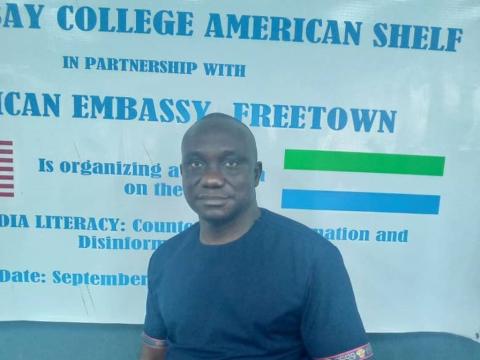By Abdulai Fasineh Dumbuya
The US Embassy in Freetown in partnership with Fourah Bay College (FBC) conducted a Media Literacy Training on Countering Disinformation, Misinformation and Fake News, with the introduction of Artificial Intelligence (AI) as the new player.
Addressing the student trainess, the Emerging Voices Specialist at the U.S. Embassy, Abass Kalokoh said that the rise of AI has given birth to new forms of disinformation and misinformation.
According to him, this synthetic media manipulates and modifies data and multimedia by automated means, noting the fear that it could supercharge fake news, spread misinformation and distrust of reality.
Speaking on the types of (AI), he said "Deep Fakes" are synthetic media in which a person in an existing image or video is replaced with someone else's likeness.
"This is a powerful technique to manipulate or generate visual and audio content with a high potential to deceive," he said.
He went on to say that "Speech Synthetic" is another branch of synthetic media that can artificially produce human speech, saying that it incorporates a model of the vocal tract and other human voice characteristics to create a completely "synthetic" voice.
He said that there is a growing number of people, especially the youths, who are confusing the three variants under discourse: Disinformation, Misinformation and Fake News. He said while information is a human right issue across the world, the youth should be oriented on both the good, the bad and the ugly sides of it.
Explaining the three variants, he said disinformation is a false information intended to deliberately mislead the public by intentionally misstating the facts, whereas misinformation on the other hand is a false and inaccurate information by getting the facts wrong.
Kalokoh went on to say that fake news is the mother of disinformation and misinformation which, according to him, is purposefully crafted, sensational, emotionally charged, misleading or totally fabricated information that mimics the form of mainstream news.
Underscoring the impact of fake news, he said many bloggers and journalists alike are making a good sum of money from the public and describes the act as "encyclopedia of fake news", which has the tendency to affect the social, economic or political values of the society, as it appears to be a packaged and distributed as legitimate news.
"This is how even our newspaper editors are using their papers to launder the image of their media outlets to the government and, as such, they will end up misinforming the public, which is totally against the cardinal principles of journalism profession," Kalokoh said.
He noted that disinformation is an attribute of the government the world over as they use it to craft information in a way that when they release it in the public space, the public will take it as false but also as a reality. And he added that misinformation is usually ascribed to citizens such as bloggers, who use their platforms to attract more followers at the expense or detriment of the people.
"Because people may have affected interest in a particular issue – sometimes for social, economic or political gains – they will definitely ignore all the available tools to test the veracity of the information before sharing it in public domain. This is why misinformation has been part of our lives and is gravely impacting our lives too," Kalokoh continued.
He encouraged students to be better versions in terms of dealing with disinformation and misinformation- related issues by ensuring that whenever they come across information that's confusing , they should stop and think because, by so doing, he said they will spot information that is reliable or misleading.
Speaking to Politico, one of the students, Osman Kargbo, said that the occasion has been a vital learning and training curve . He said that in order to counter disinformation and misinformation people should self-censor themselves to curb disinformation, misinformation and fake news in the country.
Meanwhile, the occasion marked the first batch of the Media Training Session comprising 50 students from all faculties at FBC. The programme is targeting 300 students on Media Literacy to run at intervals, up to November.
The first event commenced at the FBC Library, on the 29th September, 2023.
Copyright © 2023 Politico (02/10/23)








